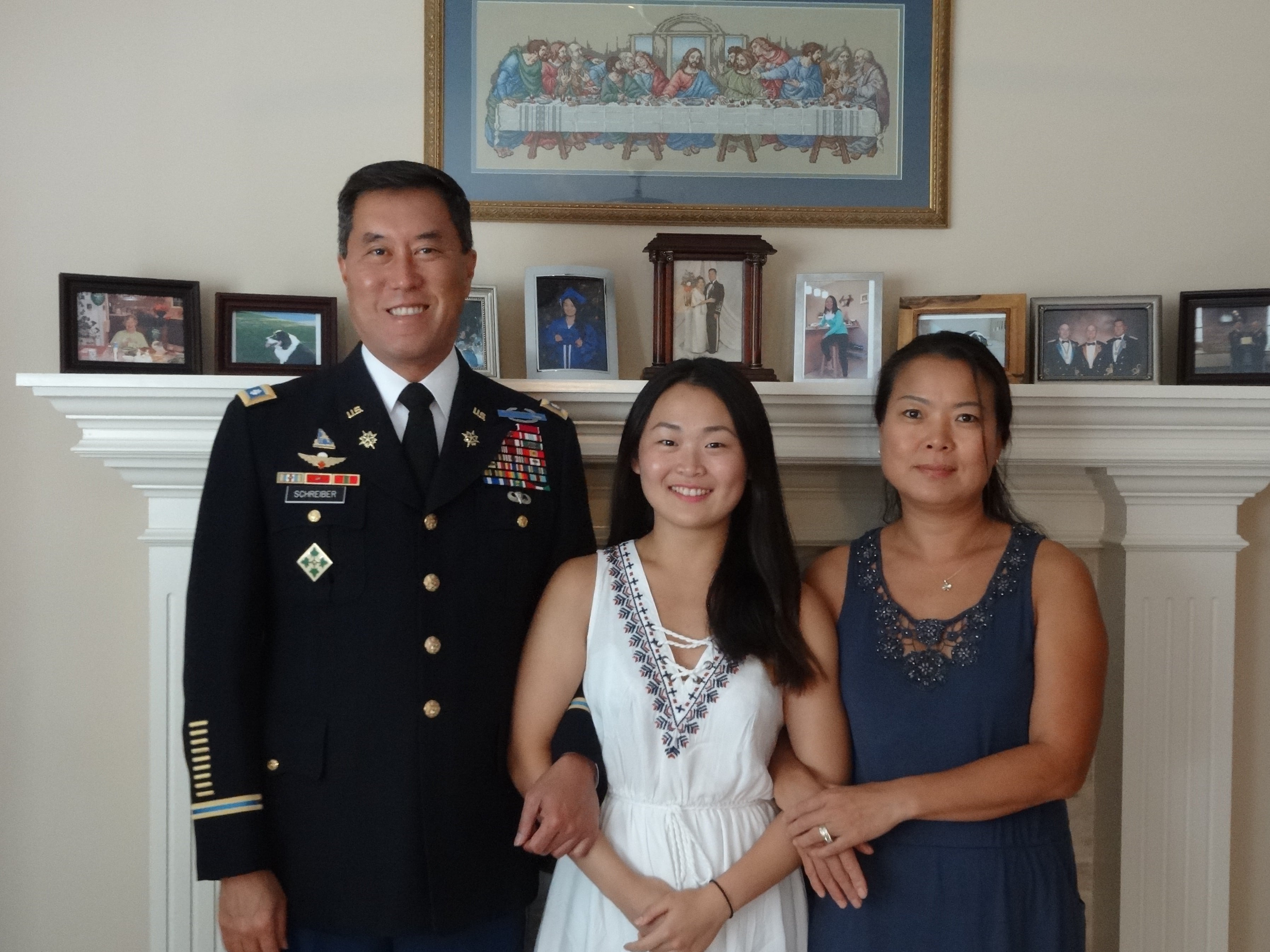Patrick Schreiber has been prepared to uproot his family from Fort Leavenworth, Kan., and move to South Korea since October.
That was when the former Army lieutenant colonel and his wife Soo Jin were informed by the Federal District Court of Kansas that their adopted daughter Hyebin will be deported back to South Korea due to U.S. immigration law that cuts off the age when foreign-born adopted children can become naturalized U.S. citizens at 16.
The Kansas court ruled that Hyebin must return to Korea after she finishes earning her chemical engineering degree at the University of Kansas, which she will do in December. Schreiber and his wife are appealing through the 10th District Court of Appeals, though they are not optimistic about their chances of winning.
“We have no delusions that everything’s going to come out like a flowing bed of roses,” Schreiber told the Military Times. “We’ve always planned for two courses of action. So it was never something that we thought, ‘Yeah, things are going to work out the way we wish they would come out.’”
The immigration policy that is forcing Hyebin to leave the U.S. is under the jurisdiction of the U.S. Citizenship and Immigration Services. A spokeswoman for USCIS told the Military Times via email that “it is USCIS policy not to comment on ongoing litigation, nor will we speak to individual cases due to privacy concerns.”
Schreiber said that he doesn’t necessarily blame USCIS for enforcing its adoption law.
“We understand fully what their policy is,” he said. “They more or less have come back and said they understand our situation. It’s not like they’re compassionless.”
Hyebin is Schreiber and Soo Jin’s niece, who first came to live with them on a student visa when she was 13 because of troubles at home. Schreiber was deployed to Afghanistan soon after, but after he returned they started the adoption process to legally make her their daughter.
“She grew accustomed to our family,” he said. “We love her dearly, she loves us.”
The adoption went through when she was 17, which the Schreibers didn’t realize made her too old to become a naturalized U.S. citizen. That’s when the family turned to Rekha Sharma-Crawford, a lawyer based in Kansas City, Mo., who specializes in cases involving non-U.S. citizens.
While Schreiber’s military service doesn’t have any direct links to his current situation, Sharma-Crawford said he deserves a break.
“It’s one of those families that your heart just goes out to,” she told the Military Times. “They’re warm, wonderful salt-of-the-earth people. The fact that someone who served their country is being put into a position where he has to choose between the country he served and his daughter, that just leaves me speechless.”
Schreiber was in the Army for 27 years and participated in major operations like Just Cause, Desert Storm and Desert Shield. He also completed two tours in both Iraq and Afghanistan and has been working as a Department of Defense contractor since his retirement in 2015.
“The greatest regret he has when you ask him is that when he took the deployment to Afghanistan, is that he put his country before his daughter,” Sharma-Crawford said. “He’s not going to do that again. It’s heartbreaking stuff.”
Sharma-Crawford is currently doing everything in her power to move the appeals process along. She has sought out co-counsel assistance from Georgetown Law School’s Institute for Constitutional Advocacy and Protection for help with the Schreiber case.
She said that in many ways, U.S. law has become more sympathetic to different types of parentage including surrogacy, artificial insemination and same-sex marriages. But, as she put it, USCIS needs to “recognize that society has changed” in terms of dealing with immigration adoption cases like this.
“Our position has been that that’s not ever what Congress intended,” Sharma-Crawford said. “We think the law is clear … and all throughout the history of this statute, its overarching concern to make sure families remain together and no family should have to be placed in a situation where they have to choose their child over their country. We’re hoping the 10th Circuit takes a good look at it and comes to the same conclusion as we did.”
She praised Hyebin for maintaining her composure through this trying legal battle.
“She’s a trooper,” Sharma-Crawford said. “She’s a great Midwestern girl. She’s under a lot of pressure. No one would want any child to be under that kind of pressure as they try to navigate school.”
Schreiber’s main focus at this point is making sure Hyebin gets her degree before she is deported. If the appeal doesn’t work, they are fully prepared to move to Korea with Hyebin.
“It really comes down to keeping us together,” he said. “It would be harder on us to not be a part of Hyebin’s life.”









